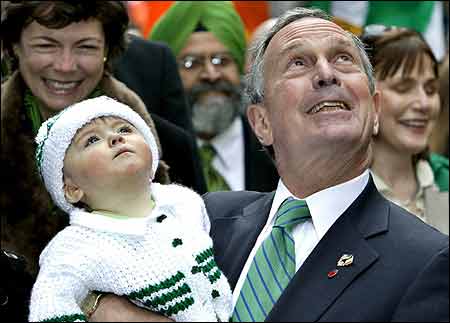 From NYTimes.com:
From NYTimes.com:
New York City mayor Michael Bloomberg, a former Democrat who was twice elected as a liberal Republican, is formally becoming a political independent ? a move that will intensify speculation that he is considering a presidential race in 2008.
Is it a good move for Bloomberg? For the country? More details and a poll after the jump.
More:
Bloomberg has said he has no plans to enter a 2008 presidential race that includes Republican candidate Rudolph Giuliani, Bloomberg's successor as New York City mayor. But Bloomberg's allies have not discouraged the White House speculation, and the mayor himself has stoked speculation about a presidential run through some recent appearances and public statements - including a speech Monday at a Los Angeles conference entitled, "Ceasefire! Bridging the Political Divide."In that speech, Bloomberg said decisions in Washington, D.C., "are more political and less issue-based than, I think, ever before, and the consequences have been disastrous for us." He said that "inaction and partisan gridlock are destroying our relationships and reputation around the world."
Bloomberg could be a credible independent presidential candidate, in part because his vast personal wealth would enable him to overcome strict ballot-access requirements and also pay for a national advertising campaign and professional staff. Surveys show that many voters are frustrated with the Democratic and Republican parties and by what they see as rampant partisanship.
Bloomberg was never a real Republican. He just used their spot on the ballot to sidestep New York City's inept Democratic machine, which hasn't been able to elect a Democratic mayor since the '80s in a city that has five Democrats for every Republican.
Bloomberg has governed as a fiscal conservative and social liberal. He forcefully pushed through a citywide smoking ban despite strong opposition from restaurants and the New York Post. It turned into a major victory -- indoor air pollution at bars and restaurants is down sixfold, and both city and state studies have shown business has actually improved.
Now Bloomberg is pushing a major new plan to turn the Big Apple green -- into what he calls "the first environmentally sustainable 21st-century city." At a time when none of the presidential candidates have announced radical plans to stop global warming (even Barack Obama is waffling on coal), it sets Bloomberg far ahead of even the Democratic presidential candidates.
So what do you think? How does a Bloomberg candidacy impact the 2008 race?
This discussion should not be so much a speculation of "He's done so much for NYC, what could he do for the USA?" but a rallying call for election reform. Publicly financed elections is intended to keep big money out of politics.
A Bloomberg candidacy would circumvent any campaign reform accomplished to date because he's using his own money. He's a media tycoon. What are the chances of any opponent getting any attention? A self-financed campaign by Bloomberg would free up a lot of GOP cash for buying back the Congress.
Anyone who believes that Bloomberg may be compatible with some Democratic Party ideals should look back to his actions during the New York Transit strike.
To me, business experience is not a plus. Any more than it was for Ross Perot. Making a pro-business decision that may be interpreted as something a couple of ticks to the left of radical conservatism should not paint him as a liberal Rebublican; it is still pro-business. All business, all the time is an ideal environment to incubate the next Enron or encourage further consolidation of finance, media, and other areas of commerce that we currently have diminishing choices in.
This is a theme awakened in recent political history by Mark Warner as Governor of Virginia. My good Democratic Governor John Lynch in NH picked it up and was recently reelected in this red state with 80% of the vote with it. It was leading to a new Democratic awakening. What happened?
I think he could possibly win it all - saturate the tv and radio airwaves from Jan. 08 to Nov. 08, show how ineffective both parties really are, and be the straight shooter that none of the current candidates isnt? It's a winning strategy to me.
1. Bloomberg would pull some votes from both parties. Not the die hards and loyalists, but from moderates who generally support their party but are willing to look outside the box. Neither party has a sure thing in their hopefuls so it wouldn't take much to convince the non-loyalists and non-extremists in either party to support Bloomberg.
2. Independents who don't usually vote would would throw massive support (in numbers) behind him because many of these people are disillusioned with the establishment (both parties).
3. However, because many of those Independents who usually don't vote are typically driven not to vote by apathy, skepticism, or cynicism, their actual support in terms of level of effort will be fairly low. Meaning weak campaign support and weak turn out on election day - so he won't pull enough real votes to make a difference.
I could be wrong on #3 - if something lights a real fire with the Independents and they truly become motivated and involved, Bloomberg could very well be the next President. If he runs.